Tired of dirty dishes? I've started putting lemons in my dishwasher – here's why I'll never load it without them again
A simple citrus fruit can be your secret weapon for sparkling dishes and a fresher-smelling machine this holiday hosting season

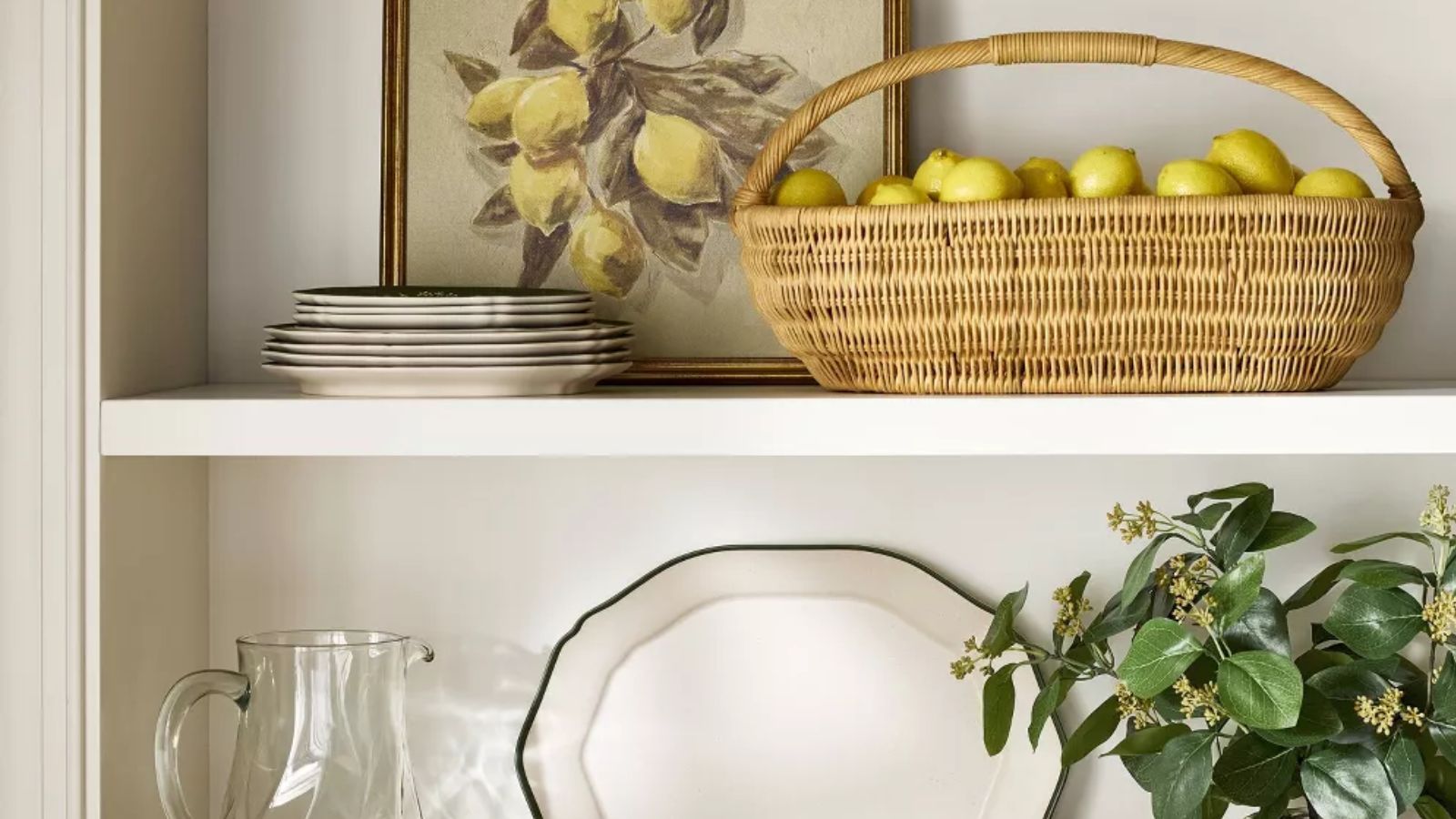
Design expertise in your inbox – from inspiring decorating ideas and beautiful celebrity homes to practical gardening advice and shopping round-ups.
You are now subscribed
Your newsletter sign-up was successful
Want to add more newsletters?

Twice a week
Homes&Gardens
The ultimate interior design resource from the world's leading experts - discover inspiring decorating ideas, color scheming know-how, garden inspiration and shopping expertise.

Once a week
In The Loop from Next In Design
Members of the Next in Design Circle will receive In the Loop, our weekly email filled with trade news, names to know and spotlight moments. Together we’re building a brighter design future.

Twice a week
Cucina
Whether you’re passionate about hosting exquisite dinners, experimenting with culinary trends, or perfecting your kitchen's design with timeless elegance and innovative functionality, this newsletter is here to inspire
Lemons are the answer to all your cleaning woes – a bold statement, I know. But after adding lemon halves to my dishwasher for a month, it’s safe to say I’ll never run a wash without this kitchen staple again.
From a nicer-smelling load to more sparkly dishes, placing the citrus sensation in my dishwasher has taken my cleaning game to new heights, and it's come just in time for hosting season, when my dishwasher will have its busiest few months of the year.
After speaking to experts, it’s clear to see why this lemon hack works: This natural and effective cleaning agent contains citric acid, which is known and loved for its grime-busting and shine-adding abilities.
Of course, cleaning with lemon juice is nothing new, as it has exceptional cleaning power, able to easily to refresh your refrigerator, banish bad smells from bins, and even remove rust. Now, defunking your dishwasher and a supercharged clean is a lemon away.
How I use lemon halves in my dishwasher
We have the internet to thank (and perhaps unthank) for many of the best and worst decluttering and cleaning tips doing the rounds on social media. But the ‘lemon in a dishwasher hack’ has firmly gone on the list of great cleaning tips that really work.
And at this time of year, as we spend more time at home, invite more guests for meals and host for entire weekends, the dishwasher is the one appliance you need on top of its cleaning game.
So what is this dishwasher hack, I hear you ask? Well, like many of the best cleaning tricks, the lemon in a dishwasher trick is easy, simple, and, costing just the price of a lemon (or two), seriously affordable. Not to mention, it's free of harmful toxins.
Design expertise in your inbox – from inspiring decorating ideas and beautiful celebrity homes to practical gardening advice and shopping round-ups.
What you'll need
- A pack of lemons: As their name suggests, this pack of lemons from Walmart is a better value than buying them individually.
- A sharp knife: This Farberware Edgekeeper 3.5-Inch Paring Knife, available on Amazon, is a bestseller for good reason. Ergonomically designed, the utensil comes with a self-sharpening blade cover that not only adds protection but also sharpens the blade's edges with every use. You'll need to cut the lemon and de-pip.
- A chopping board: Suitable for the dishwasher, this durable 9"x13" Recycled Poly Essentials Cutting Board is made from hard-wearing polypropylene, which will protect your kitchen counter from any scratches.
Using one of the items you can substitute for dishwasher tablets, the idea is that you cut a lemon in half, remove all the seeds, and place the halves in the top rack of your dishwasher so they can work their citrus magic. Not only is this safe, but as Lina DaSilva, founder of Toronto Shine Cleaning, confirms, it will help freshen up your dishwasher.
‘As long as you don’t overload the dishwasher with too many lemon halves, using lemons in your dishwasher is safe to do,' DaSilva says. 'Just one or two does the trick. They’re not going to damage your dishwasher, and they’re great for keeping things fresh.’
This is especially important when you have lots of guests coming in and out of your kitchen. Nobody wants a stinky whiff of a dishwasher just before sitting down to dinner on plates and cutlery taken out of it.
Why you should use lemons in your dishwasher
After putting this hack to the test, here are the three major benefits I discovered:
1. My dishwasher smells amazing
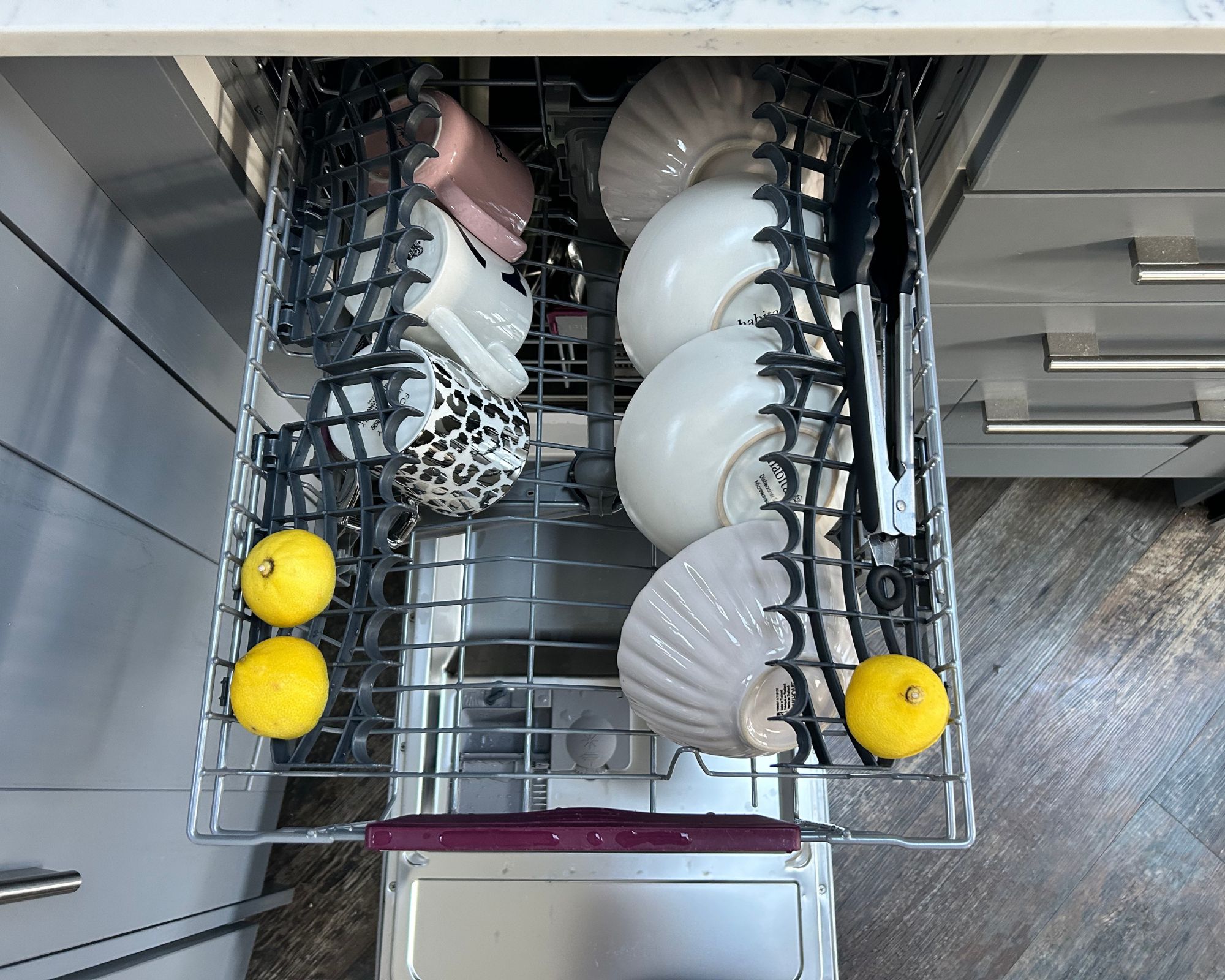
My dishwasher with lemons inside
It's no secret that these appliances can harbor some less-than-pleasant odors, which is why you should regularly clean your dishwasher. My machine, which sits for hours with dirty dishes inside, was no exception.
But after just one cycle with a lemon inside, every time I opened the dishwasher's door, I was greeted with a vibrant, uplifting scent. It wasn't a coincidence.
As professional cleaner Lina DaSilva confirms, 'Lemons help with odors. They leave a fresh scent, which is a nice bonus, and they can cut through grease a bit better than just soap. The acidity helps break things down.'
But as is the case when it comes to cleaning a refrigerator or a microwave with the fruit, smelly dishwashers are no match for lemon juice. Come morning, noon or night, every time I open my dishwasher after popping lemon halves in it, I’m greeted with the vibrant, energizing, and uplifting scent of the zesty kitchen staple.
Learn how you can use lemon juice for home cleaning.
2. It’s added shine to my glasses
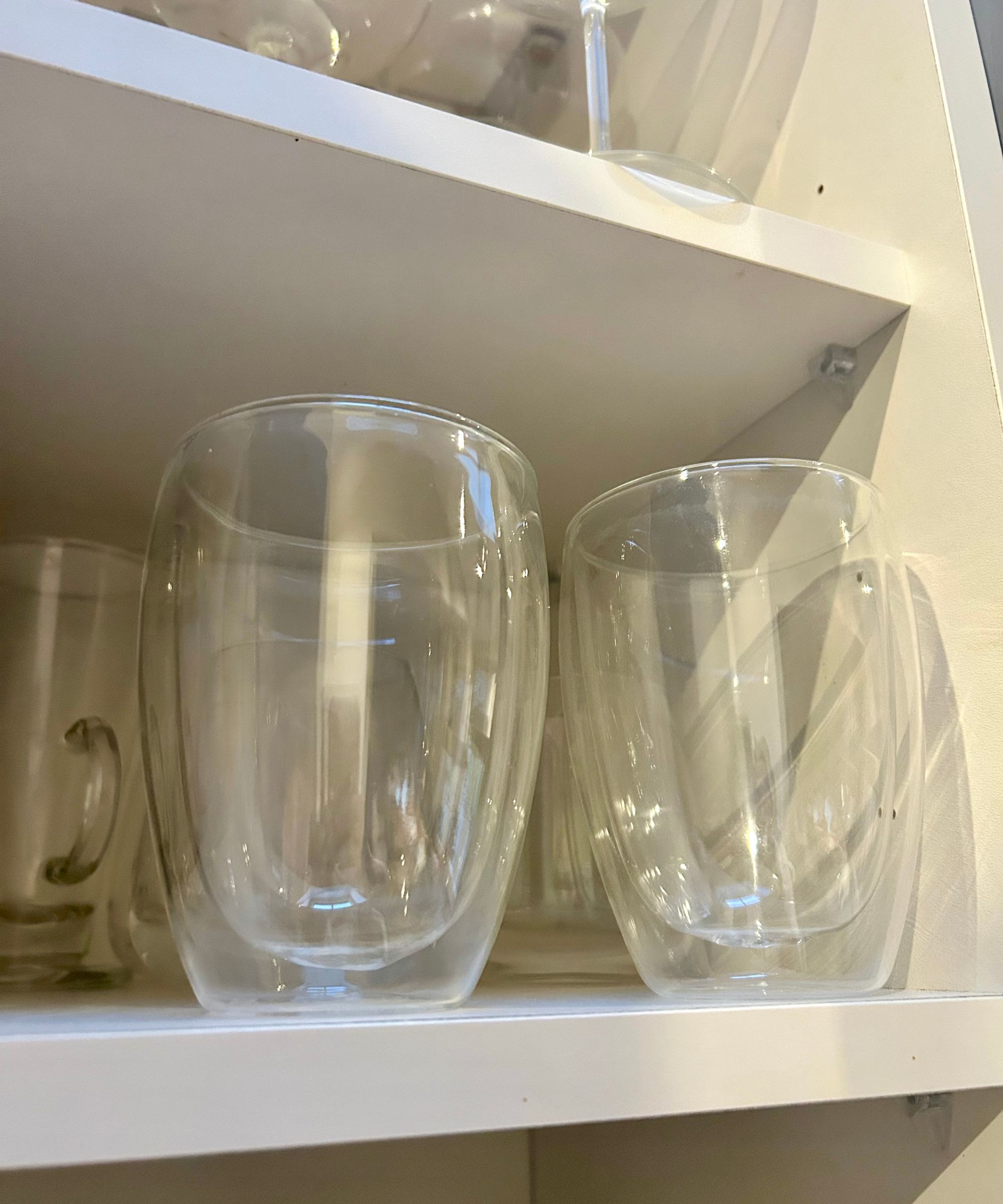
My spotless glasses after being washed in a dishwasher with lemon
If you’ve ever wondered ‘why are my glasses going cloudy in the dishwasher?’, you’ve probably researched how to remove cloudiness from drinking glasses and then come up against the problem again.
Unpleasant marks are the last thing you need when champagne is flowing, or those long winter meals spent with your friends and family, and fuelled by festive cocktails, mulled wine, or your favorite glass of white are underway.
It's a problem I've encountered over the years, so I’ve tried various dishwasher tablets, dishwasher salts and a handful of dishwasher rinsing aids to help shift. But nothing has stood up to watermarks or cloudiness quite like this simple citrus hack.
‘Thanks to the natural oils in lemon peel, they can make glasses and cutlery look a bit shinier,’ DaSilva explains. ‘It’s not a night-and-day difference, but it helps.’
3. It’s environmentally friendly
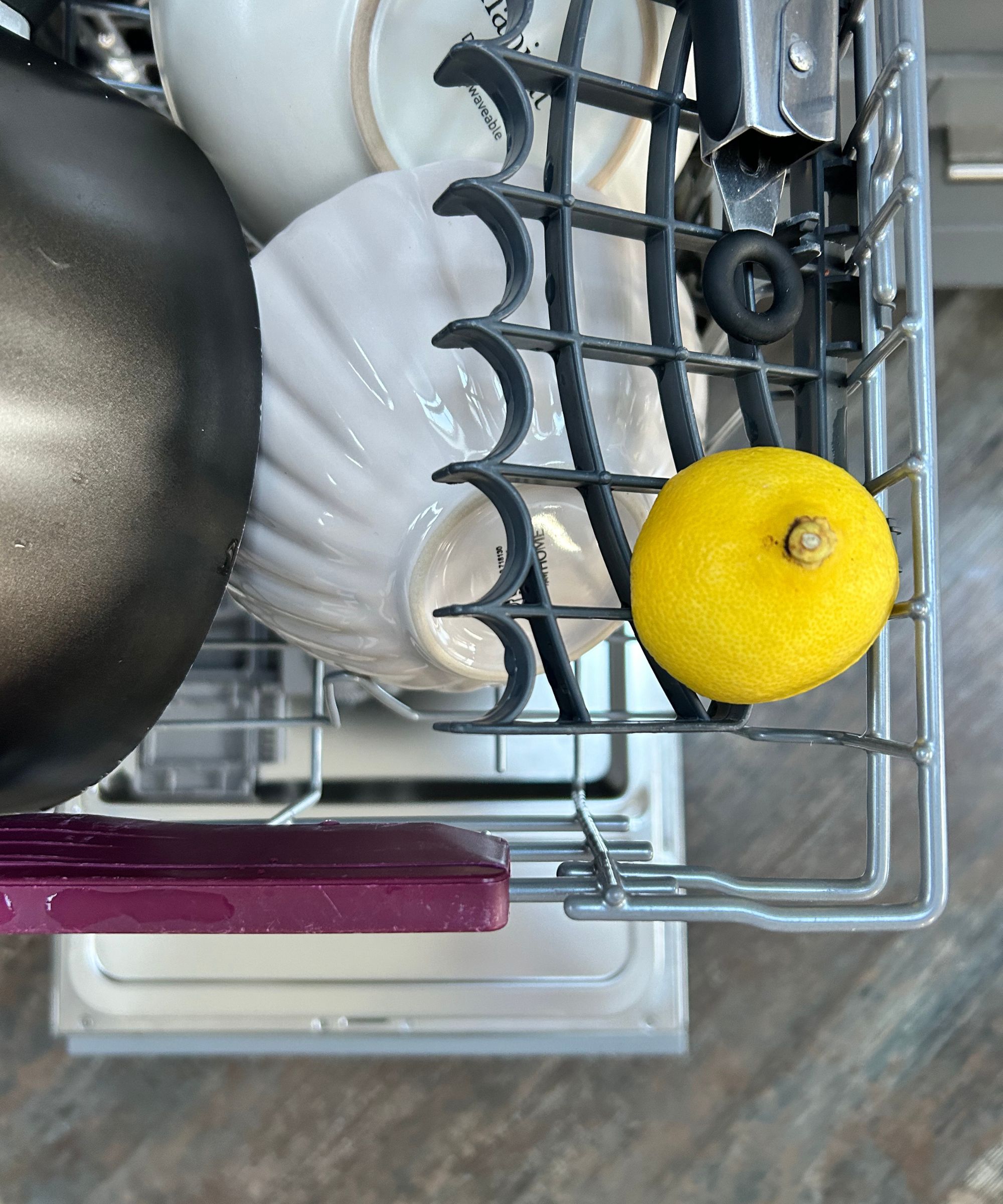
My dishwasher after use
Just like cleaning with vinegar or with baking soda, lemon juice offers a natural and eco-friendly way to spruce up your home.
But what’s nice about this dishwasher hack is, like when using lemon halves for kettle descaling, nothing goes to waste.
For example, after using lemon juice in my meals to add a citrus hit, instead of placing them in my food bin, I now add them to my dishwasher, so their use goes further and you won't end up feeling you've wasted a fresh lemon on a cleaning job.
4. It’s got rid of limescale from my dishwasher
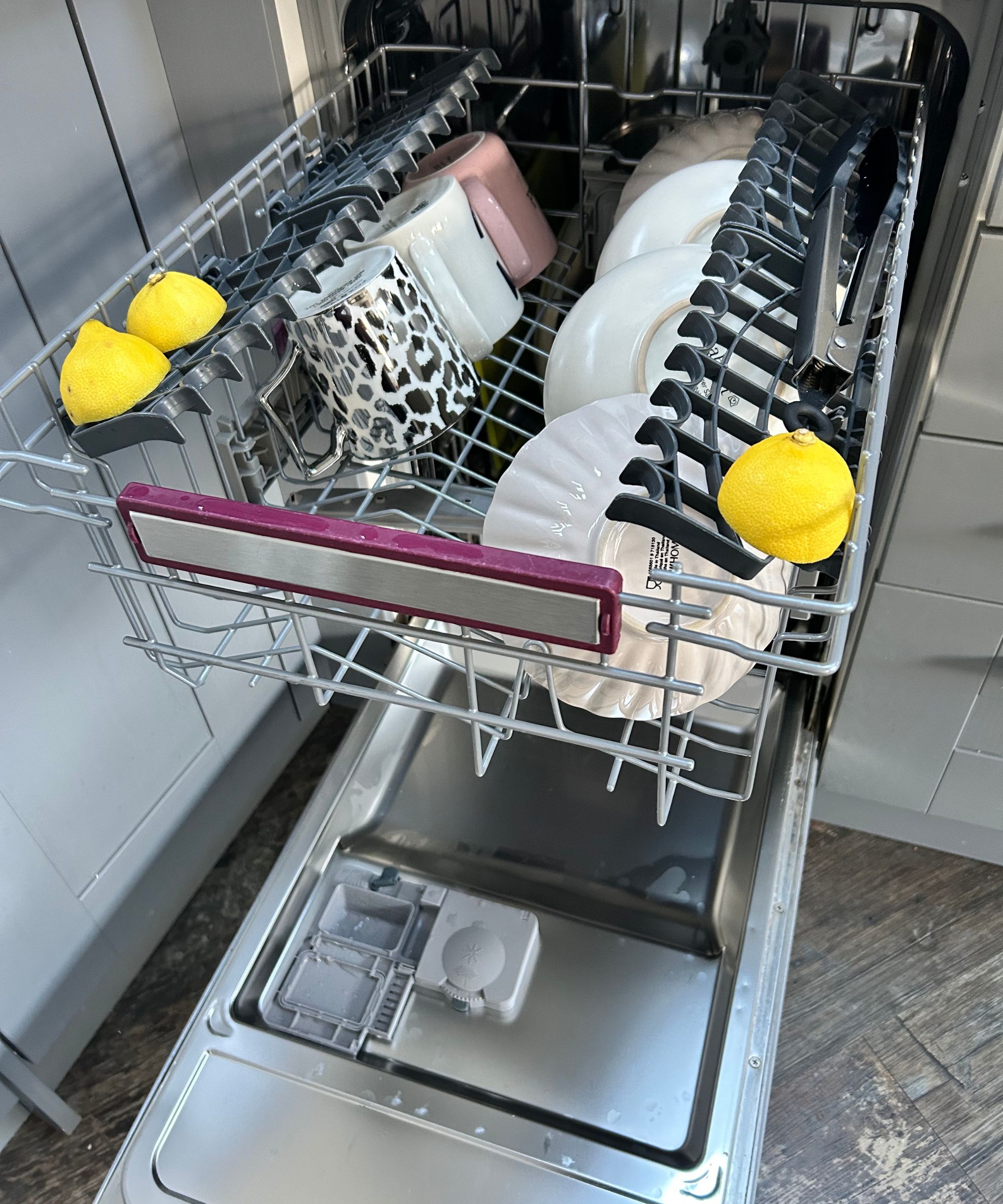
My dishwasher doesn't have any mineral build-up anymore
Ever since learning how to clean a dishwasher properly, I try to give this hardworking kitchen appliance some TLC every month. But, like most of us, life can get on top of me and this sort of task can fall further and further down my to-do list.
However, since placing lemons in my dishwasher, I’ve noticed that the fruit has stopped limescale deposits from building up in my appliance. This is even more important when you're having to run more cycles than usual, such as during fall and all the hosting that entails.
Logan Taylor, president of The Dazzle Cleaning Company says, ‘I like to put lemons in the dishwasher because it keeps limescale at bay. Some manufacturers even recommend cleaning with citric acid from time to time as it helps reduce limescale.’
Whilst lots of people
A deeper clean for the holidays
While the lemon hack is great for daily use, the holiday season calls for more thorough cleaning of your machine to prepare for heavier and more frequent use. Here are some simple, seasonal steps you can add to your routine:
- Clean the dishwasher filter: During the holidays, the dishwasher filter can get clogged with food residue from big meals. A monthly cleaning of this filter is essential to prevent food particles from ending up back on your dishes.
- Deep-clean the entire machine: In addition to the lemon trick, consider running an empty, hot cycle with a dishwasher cleaning tablet such as Affresh, available at Amazon, designed to break down mineral buildup. While some experts don't recommend using vinegar or baking soda together, they can be used in separate cycles to give the machine a more thorough and natural clean.
- Polish the exterior: With guests coming and going, it's a good time to wipe down the exterior of your dishwasher, especially the handle. Use a soft microfiber cloth with a mild cleaner (hot soap water will be fine) to remove smudges and fingerprints, leaving your kitchen looking polished and ready for the holidays.
What to shop
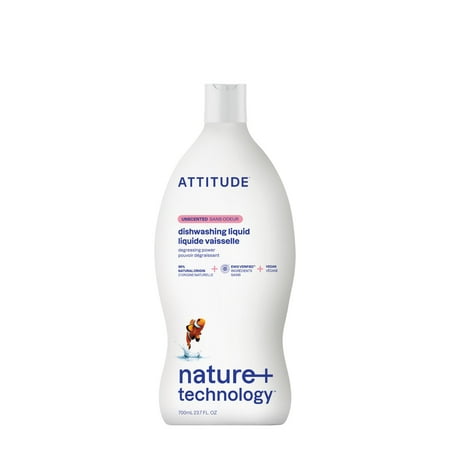
This dish soap is made with clean ingredients and is Environmental Working Group verified, meaning it is certified as non-toxic for your home and the environment. It is the perfect choice for washing dishes and avoiding harsh chemical buildup.
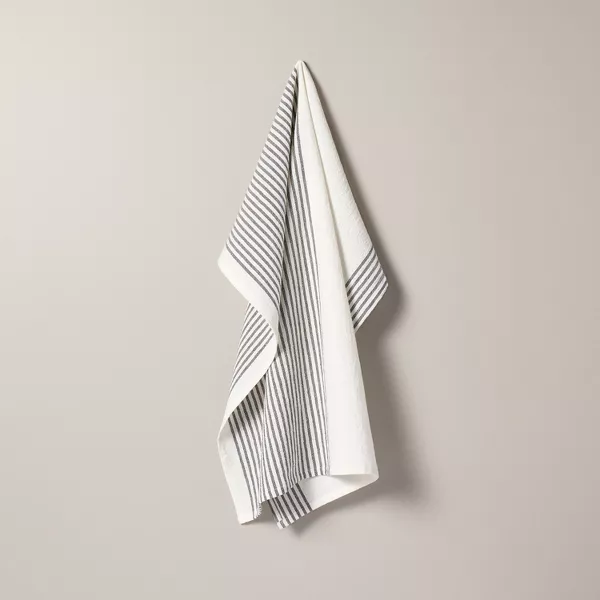
This kitchen towel is made from 100% cotton, which makes it soft to the touch and super absorbent, coming in handy for anything from drying dishes and glassware to wiping up spills when there are lots of guests in the house.
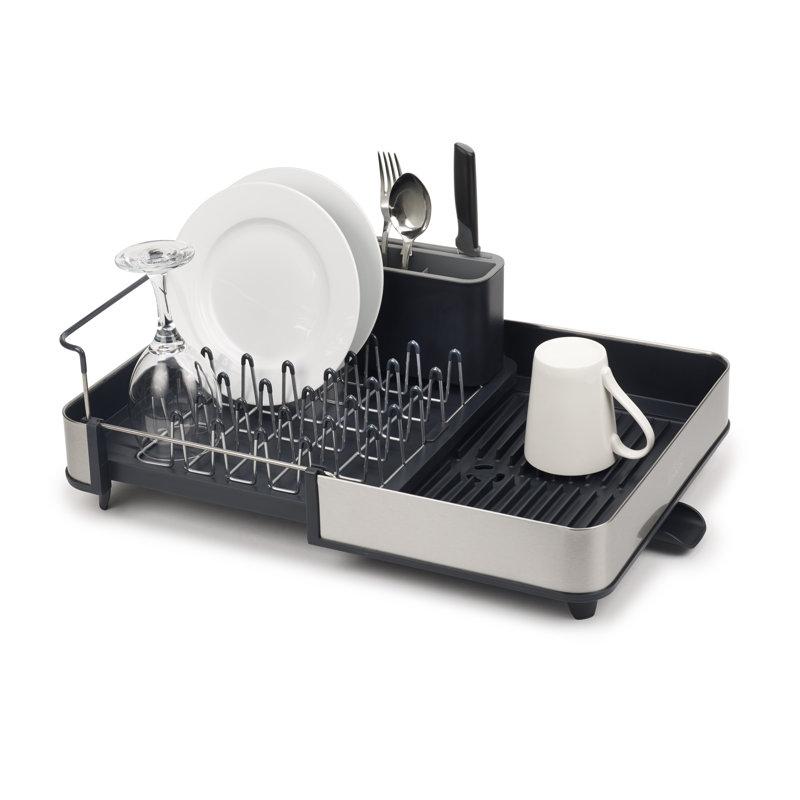
Some extra drying space for all the big dishes that won't fit in the dishwasher, or are hand-dry only, won't go amiss in the holiday season. This is also coated with a non-scratch material that helps protect your dishes.
So, next time you’re using lemons, instead of throwing them in your food waste bin, pop them in your dishwasher and see what benefits you notice.
Wonder what other things you can use citric acid for around the house? Discover how professional cleaners use this natural cleaner around the home, and how best to prep your home for fall.

Rebecca was a senior digital writer at Hearst Magazines before leaving her role to go freelance in 2019. Since then, she has written extensive homes and lifestyle content for leading brands including Homes & Gardens, Livingetc, Real Homes, Good Housekeeping, Kitchens, Bedrooms & Bathrooms and House Beautiful. When she's not writing, Becks is trying out the latest viral cleaning and organizing hacks to see if they actually work, decluttering her home (because less is more this spring), or color-coding her bookshelf.